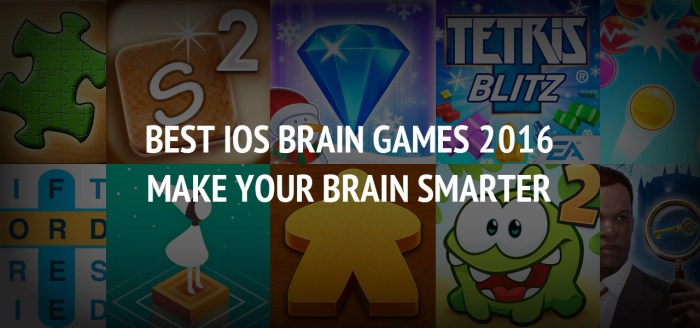Introduction to Brain Games on iPhone
iPhone brain games offer a diverse range of mental exercises, catering to various cognitive skills. These apps utilize interactive gameplay to engage users in activities that challenge memory, logic, and problem-solving abilities. Many apps are designed with user-friendly interfaces and progressively challenging levels to keep users motivated and engaged. This article explores the world of iPhone brain games, examining their features, effectiveness, and user experience.
Overview of iPhone Brain Games
A plethora of brain-training apps are available on the App Store, each targeting different cognitive functions. These games can improve memory, enhance focus, sharpen logic, and boost problem-solving skills. Popular apps often employ various game mechanics, such as matching, puzzle-solving, and strategic thinking, to achieve these goals.
Examples of popular brain game apps include Lumosity, Elevate, and Peak. These apps frequently feature diverse game modes and challenges, ensuring ongoing engagement.
Comparison of Popular Brain Game Apps
| App Name | Target Skill(s) | Key Features | User Rating (Estimated) |
|---|---|---|---|
| Lumosity | Memory, Focus, Problem-Solving | Personalized training plans, various game types, detailed performance tracking | 4.5 Stars |
| Elevate | Attention, Speed, Reaction Time | Gamified brain training, daily challenges, progress visualization | 4.3 Stars |
| Peak | Memory, Learning, Mental Agility | Interactive exercises, adaptive difficulty, customizable learning paths | 4.6 Stars |
Categorizing iPhone Brain Games

iPhone brain games can be categorized based on the cognitive function they primarily address. Understanding these categories allows users to select games that align with their specific learning goals.
| Category | Description | Examples |
|---|---|---|
| Memory Games | These games focus on improving memory retention and recall. | Matching games, sequence games, image recognition games |
| Logic Puzzles | These games challenge users to solve puzzles using logical reasoning and deduction. | Sudoku, logic grids, riddles |
| Problem Solving Games | These games involve complex scenarios and require strategic thinking and problem-solving skills. | Strategy games, resource management games, complex puzzles |
Evaluating Game Mechanics and Design
Effective brain games often utilize intuitive interfaces and well-designed mechanics. The user experience (UX) plays a significant role in engagement and motivation. Difficulty levels should be adjustable to ensure that players are neither overwhelmed nor bored. Game mechanics tailored to specific cognitive functions, like memory training or reaction time improvement, are often more effective.
User Experience and Engagement

Measuring the effectiveness of brain games involves analyzing user engagement metrics like completion rates, time spent playing, and user feedback. Motivational factors in game design, such as progress tracking and rewards, contribute to sustained user engagement. A good UX involves clear instructions, intuitive controls, and aesthetically pleasing visuals.
Analyzing the Effectiveness of Brain Games
Scientific evidence regarding the effectiveness of brain games is mixed. While some studies show improvements in cognitive performance, others have identified limitations. Factors like the type of game, the user’s baseline cognitive abilities, and the duration of use all influence the outcome. Integration into educational and therapeutic settings is a promising area for further research.
User Reviews and Feedback
User reviews offer valuable insights into the strengths and weaknesses of various brain games. Positive feedback often highlights the engaging gameplay and noticeable improvements in cognitive skills. Negative feedback may address issues such as repetitive content or lack of progress tracking.
Top Recommendations and Suggestions
Selecting the right brain game depends on individual needs and preferences. Users seeking memory enhancement might find matching games beneficial, while logic puzzle enthusiasts might enjoy Sudoku. Incorporating brain games into daily routines can promote consistent cognitive stimulation.
Future Trends in Brain Games
Future brain games may leverage AI to personalize learning experiences, adjusting difficulty and content based on individual performance. Interactive and adaptive learning algorithms could optimize the effectiveness of these games. Advancements in haptic feedback and virtual reality might enhance the user experience and immersion in these activities.
Conclusion
In conclusion, the best iPhone brain games provide a dynamic platform for mental stimulation and skill development. We’ve explored various categories, analyzed game mechanics, and considered user feedback to offer a nuanced perspective on the effectiveness and engagement of these apps. From enhancing memory to improving problem-solving abilities, these games offer a valuable resource for anyone seeking to maintain and improve cognitive function. Ultimately, choosing the right brain game depends on individual needs and preferences, but this guide provides the tools to make an informed decision and embark on a journey of mental wellness.